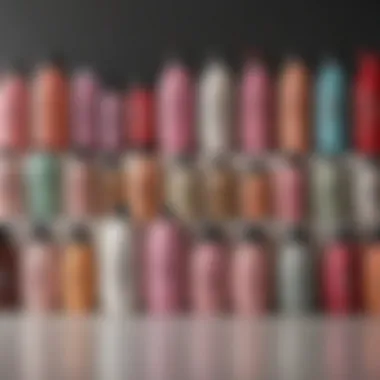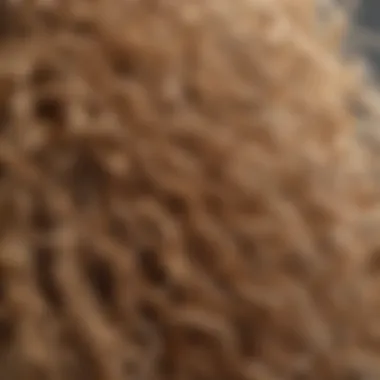Optimal Hair Care: Best Shampoo & Conditioner for Coily Hair


Intro
Coily hair is a unique and beautiful texture that deserves special attention. Understanding how to care for coily hair is essential for maintaining its health and style. The right shampoo and conditioner can make a significant difference. This article aims to explore the best products designed specifically for coily hair. It will also discuss the unique characteristics of coily hair, why moisture is crucial, and how the right ingredients can enhance the hair's natural beauty.
As we navigate through various product options, we will analyze key ingredients and common concerns that often affect coily hair. This comprehensive guide is intended for women of all ages who seek effective solutions tailored to their specific hair needs.
By the end of this article, you will gain a deeper understanding of how to select the right products and how to apply them for optimal results. Let’s begin our journey to better hair care.
Understanding Coily Hair
Understanding coily hair is fundamental for anyone seeking to achieve optimal hair care. This section will delve into the specific characteristics and challenges associated with coily hair, enhancing awareness about its unique structure and needs. Recognizing these aspects can lead to better product choices and hair care routines tailored specifically for coily hair.
Defining Coily Hair
Coily hair, often referred to as Type 4 hair, is characterized by its tight curls or kinks, forming a zigzag pattern. This unique curl pattern is a result of the hair shaft's elliptical shape. Individuals with coily hair may notice a range of textures, from wiry to soft. Importantly, coily hair is often sensitive to humidity, which leads to changes in texture. Understanding these defining features is crucial in selecting appropriate products and methods for care.
Characteristics of Coily Hair
Coily hair is known for its distinct properties:
- Shrinkage: This hair type typically shrinks significantly when wet or dry, often appearing shorter than its actual length.
- Volume: Coily hair has a naturally voluminous appearance due to its structure, which allows it to expand outwards.
- Dryness: The twists and turns of the hair can hinder natural oils from traveling down the shaft, making coily hair more prone to dryness and breakage.
- Brittleness: Coily hair is often more fragile compared to straight or wavy hair due to its structure, making it essential to handle it with care.
Understanding these characteristics helps individuals make informed decisions about moisturizing and protective styling.
Common Challenges Faced by Coily Hair
Coily hair comes with its own set of challenges:
- Moisture retention: One of the biggest challenges is maintaining moisture. Coily hair easily loses water and requires more frequent hydration.
- Breakage: This hair type can break easily, especially if not properly maintained. Regular conditioning and gentle handling are key.
- Detangling: The tight curls can lead to tangles, which require careful and gentle detangling techniques to avoid further damage.
- Product buildup: Coily hair can experience product buildup more quickly, necessitating regular, careful cleansing to avoid weighing the hair down.
Understanding these challenges permits individuals to adapt their grooming habits, ultimately promoting healthier and more manageable coily hair.
The Role of Shampoo in Hair Care
Shampoo serves a foundational role in the hair care regimen, especially for individuals with coily hair. Unlike straight or wavy hair, coily hair has unique structural and textural characteristics that necessitate specialized care. Shampoos designed for coily hair typically focus on cleansing without stripping moisture. This is crucial since coily hair is often drier than other hair types owing to its shape, which makes sebum distribution less efficient. By choosing the right shampoo, one can ensure that the hair remains clean while retaining essential oils, thus promoting overall health and appearance.
Shampoo Types and Their Functions
Different types of shampoos exist to cater to varying needs. These include:
- Clarifying Shampoos: These are designed to remove buildup from products, oils, and other residues. However, they can be too harsh for coily hair if used frequently. Use sparingly to avoid over-drying the hair.
- Hydrating Shampoos: Ideal for coily hair, these shampoos focus on moisture retention and often contain ingredients like glycerin or aloe vera.
- Sulfate-Free Shampoos: Formulated without sulfates, these shampoos cleanse gently and are great for maintaining moisture levels. They are a preferred choice for individuals with coily hair.
- Detangling Shampoos: These contain slip agents, making them easier to comb through the hair during washing.
Understanding these shampoo types allows individuals to select products that align with their specific hair needs.
How Shampoo Affects Coily Hair
Coily hair is often more vulnerable to damage from harsh cleansing agents. The way a shampoo interacts with this hair type can determine the success of a hair care routine. Using a cleaning product that is too aggressive can lead to an increase in dryness and frizz. Because coily hair already has a tendency to lack moisture, gentleness is paramount. A balanced shampoo can help maintain the hair’s natural oils, reducing the risk of breakage and enhancing hair resilience. Proper shampooing techniques also minimize tangling, which is beneficial for maintaining hair health.
Key Ingredients to Look For
When selecting a shampoo for coily hair, it is essential to scrutinize the ingredient list. Look for:
- Natural Oils (like coconut or jojoba): These help to moisturize the hair and prevent breakage.
- Glycerin: This humectant attracts moisture to the hair, ensuring hydration.
- Aloe Vera: Known for its soothing properties, it helps with scalp health while providing moisture.
- Proteins (such as hydrolyzed silk or keratin): These strengthen the hair shaft, improving structure without weighing hair down.
Choosing shampoos that contain these key ingredients can facilitate a healthier hair care routine.
"The foundation for healthy hair begins with proper cleansing, specifically tailored to the unique needs of coily hair."
By recognizing the importance of specific shampoos and understanding their functions, characteristics, and ingredients, individuals can take significant steps toward optimal hair health. This knowledge is crucial in devising an effective hair care strategy that nurtures coily hair.


Choosing the Right Conditioner
Selecting an appropriate conditioner is crucial for maintaining the health and appearance of coily hair. This type of hair tends to be drier and more prone to frizz, making it essential to choose conditioners that specifically address these challenges. By incorporating the right conditioner into your hair care routine, you help to ensure that your hair remains adequately moisturized, manageable, and healthy. The right product can promote elasticity and promote overall hair strength while reducing breakage.
Conditioner Variants for Specific Needs
Conditioners come in various formulations designed to cater to different hair types and conditions. For coily hair, options such as leave-in conditioners, deep conditioners, and rinse-out conditioners can be beneficial. Each variant serves a specific purpose:
- Leave-in Conditioners: These products are ideal for providing ongoing moisture and protection throughout the day. They are often lightweight and help to combat frizz.
- Deep Conditioners: These treatments are formulated to penetrate deeper into the hair shaft. They are often used weekly and can help repair damage, restore hydration, and improve elasticity.
- Rinse-out Conditioners: Typically used after shampooing, these conditioners help to detangle and soften the hair. They can provide hydration but may not offer long-lasting effects like deep conditioners.
Evaluating your hair's specific needs can guide you in selecting the right conditioner type to integrate into your routine.
Benefits of Deep Conditioning
Deep conditioning can be likened to a nourishing treatment for coily hair. It provides multiple advantages:
- Enhanced Moisture: Coily hair often struggles with dryness. Deep conditioning treatments can deliver moisture right where it is needed most.
- Damage Repair: Regular deep conditioning can help mend split ends and reduce breakage, making your hair appear healthier over time.
- Improved Elasticity: Increased hydration can enhance hair elasticity, allowing for better curl formation and reducing the likelihood of frizz.
- Softer Texture: A thorough deep conditioning routine will leave coily hair feeling softer and more manageable.
For optimal results, many recommend deep conditioning at least once a week.
Essential Ingredients in Conditioning Products
When evaluating conditioners, pay attention to the ingredient list. Certain components may provide significant benefits for coily hair:
- Shea Butter: This natural emollient is excellent for locking in moisture, providing nourishment without weighing the hair down.
- Coconut Oil: Known for its penetrating properties, coconut oil helps to moisturize the hair from within and reduce protein loss.
- Glycerin: As a humectant, glycerin draws moisture from the environment into the hair, making it especially beneficial in humid conditions.
- Aloe Vera: This ingredient can soothe the scalp while providing hydration to the hair strands.
Using conditioners with these beneficial ingredients can help significantly in maintaining the health and integrity of coily hair.
Product Recommendations for Coily Hair
Selecting the right products for coily hair is not a mere preference; it is essential for achieving healthy and well-maintained curls. Coily hair, known for its tight, spring-like textures, requires specific ingredients and care practices that differ greatly from other hair types. This section explores recommended shampoos and conditioners that cater to the unique characteristics and challenges of coily hair.
Using suitable products reinforces moisture retention, enhances curl definition, and prevents breakage, making product selection an important part of the hair care routine. Without proper products, coily hair may become dry, frizzy, and challenging to manage.
Top Shampoos for Coily Hair
When selecting shampoos for coily hair, look for those that are sulfate-free. Sulfates can strip natural oils, leading to dryness. Here are some top recommendations:
- SheaMoisture Coconut & Hibiscus Curl & Shine Shampoo: This shampoo is infused with coconut oil and hibiscus flower extract, promoting moisture while reducing frizz.
- Ouidad Advanced Climate Control Defrizzing Shampoo: Perfect for humidity, it helps maintain moisture balance to keep curls defined.
- Mielle Organics Babassu Oil Conditioning Shampoo: This formula nourishes the scalp while providing deep cleansing without drying hair out.
"The right shampoo serves as the foundation for a solid coily hair care routine."
Recommended Conditioners for Coily Hair
Conditioners play a critical role in maintaining moisture and softness in coily hair. Effective conditioners must provide detangling benefits and hydration. The following products are worth considering:
- TGIN Butter Cream Daily Moisturizer: This rich cream hydrates, defined curls, and adds shine.
- DevaCurl One Condition Original: Known for its ultra-moisturizing capabilities, it detangles and provides lasting hydration.
- Aunt Jackie’s Quench Moisture Intensive Leave-In Conditioner: This leave-in is excellent for those who desire long-lasting moisture throughout the day.
Combining Shampoo and Conditioner
For optimal care, combining the right shampoo with a suitable conditioner is crucial. Using products that complement each other can enhance the effects on coily hair:
- Consistency in Ingredients: Choose shampoos and conditioners with similar base ingredients to ensure harmony in moisturizing effects.
- Follow Directions: When using products, follow the recommended application techniques and timing. Allow conditioners to sit for a few minutes for better absorption.
Integrating these products into your hair care routine can lead to healthier, more manageable coily hair. Regularly evaluate your product choices to adapt to seasonal changes or evolving hair needs.
Moisture Retention Techniques
Moisture retention is crucial for coily hair. The unique structure of coily hair often leads to dryness and frizz, making effective moisture strategies essential. This section explores various techniques that nurture hydration, provide the necessary moisture balance, and ultimately support the overall health and appearance of coily hair.


Understanding Hydration Needs
Coily hair usually has a higher porosity level than other hair types. This means it absorbs moisture rapidly but also loses it just as quickly. Understanding this makes it clear that constant hydration is necessary.
Hydration needs vary from person to person. Factors like climate, hair products, and even seasonal changes impact moisture levels. Hydration goes beyond just water; it involves the right balance of moisturizers and sealants that lock in the moisture, keeping the hair healthy and vibrant. Look for signs of dryness, such as brittleness and lack of shine, as these indicate a need for better moisture management.
Moisturizing Routine for Coily Hair
Establishing a structured moisturizing routine is key for maintaining healthy coily hair. Here are crucial steps to consider:
- Choose the Right Moisturizers: Select products specifically designed for coily hair. These often contain humectants like glycerin, which attract moisture to the hair.
- Frequency of Moisturizing: Aim to moisturize at least every other day, or more frequently if your hair feels dry.
- Layering Products: Apply a leave-in conditioner followed by an oil or cream based product. This layering seals in hydration and keeps the hair soft.
- Incorporate Deep Conditioning: Use a deep conditioner weekly. This treatment replenishes moisture and strengthens the hair structure.
Adapting your routine to your hair's needs will make a noticeable difference in moisture retention.
Products to Enhance Moisture Retention
Selecting the right products is essential for effective moisture retention. The following categories are helpful:
- Leave-in Conditioners: Look for products like Cantu Shea Butter Leave-In Conditioning Repair Cream. This provides lasting moisture throughout the day.
- Oils: Natural oils, such as coconut or argan oil, can penetrate deeply to improve moisture retention.
- Deep Conditioners: Products like SheaMoisture Raw Shea Butter Restorative Conditioner are excellent options for restoring moisture.
- Moisturizing Creams: Heavy creams such as As I Am DoubleButter Cream work well for sealing moisture in coily hair.
When choosing a product, read the ingredients and test for compatibility with your hair type. A customized approach will maximize moisture retention and promote healthy growth.
"Understanding the specific hydration needs of your coily hair is the foundation for maintaining its health and beauty."
Application Techniques
Understanding the correct application techniques in hair care is crucial for maintaining the health and appearance of coily hair. Proper washing, conditioning, and detangling directly affect hair hydration, curl definition, and overall manageability. Each technique has distinct benefits that can enhance the hair’s natural texture while minimizing damage. By adopting effective methods, individuals can ensure their coily hair remains moisturized and free from breakage. Moreover, these techniques allow for the tailored care needed to address specific hair concerns.
How to Properly Wash Coily Hair
Washing coily hair may seem straightforward, but it involves specific considerations to maximize moisture retention. For starters, using lukewarm water is advisable. Hot water can strip hair of its natural oils, leading to dryness. Begin by thoroughly wetting the hair to ensure the shampoo is evenly distributed. When selecting a shampoo, look for sulfate-free options that cleanse without being overly harsh.
When applying shampoo, focus on the scalp rather than the ends. The roots require more cleansing due to oil buildup, while the lengths benefit from residual lather.
- Section the Hair: Divide hair into manageable parts. This step ensures each strand receives adequate attention.
- Use a Gentle Touch: Massage the shampoo into the scalp with fingertips, avoiding aggressive rubbing, which can cause breakage.
- Rinse Thoroughly: Ensuring the hair is free from product buildup is essential; lingering residues can lead to scalp issues and make styling more difficult.
After washing, always follow up with a conditioner tailored for coily hair.
Effective Conditioning Methods
Conditioning is a vital step for coily hair, aiming to replenish moisture and enhance manageability. Applying conditioner properly can make a considerable difference in the hair's softness and curl definition.
- Apply Generously: After rinsing out the shampoo, apply a generous amount of conditioner from the mid-lengths to the ends, where the hair is driest.
- Use Detangling Tools: A wide-toothed comb or fingers can help distribute the conditioner evenly, ensuring all strands are coated. This method also assists in detangling without causing breakage.
- Leave-In for Effectiveness: Allow the conditioner to sit on the hair for several minutes. For added hydration, consider using a plastic cap to trap heat.
Rinse out the conditioner with cool water to seal in moisture. The right conditioning, when performed correctly, can dramatically increase the hair's moisture levels.
Tips for Detangling Coily Hair
Detangling coily hair requires patience and the right methods to avoid breakage and damage. Here are some effective strategies to consider:
- Start When Wet: It is often easier to detangle hair when it is damp, especially after applying conditioner.
- Work in Sections: Sectioning the hair can help manage the tangles more effectively. Start with one section and make your way through the rest.
- Use the Right Tools: A wide-toothed comb or a specialized detangling brush can help glide through knots without causing excessive pulling.
- Apply a Detangle Spray: For stubborn tangles, a detangling spray can provide extra slip and facilitate easier combing.
Ultimately, learning how to wash, condition, and detangle coily hair properly not only enhances its appearance but also supports long-term health. Each technique contributes to the overall goal of maintaining vibrant and resilient coily hair.
By mastering these application techniques, individuals can significantly improve the quality and appearance of their coily hair.
Long-term Care for Coily Hair
Long-term care for coily hair is essential for promoting health and maintaining its unique structure. Coily hair often experiences dryness and breakage due to its natural shape, which makes it harder for natural oils to travel down the hair shaft. Thus, investing in a comprehensive long-term care routine is crucial. This routine aids in hydration, elasticity, and overall hair health. By understanding specific needs of coily hair, individuals can ensure their hair continues to thrive despite environmental and physical stressors.


Understanding Hair Porosity
Hair porosity refers to the hair's ability to absorb and retain moisture. Coily hair can be categorized as low, medium, or high porosity.
- Low Porosity: Hair cuticles are tightly packed, making it difficult for moisture to penetrate. This hair may require products that are light and easily absorbed.
- Medium Porosity: This hair has an easier time absorbing moisture but retains it well. Balanced products work well for maintenance.
- High Porosity: Hair has gaps and holes in the cuticles, allowing moisture to enter easily, but it also loses moisture quickly. Heavy creams and sealants can be beneficial for this type.
Understanding your hair’s porosity helps in selecting the right products and techniques for hydration. This knowledge is crucial for developing an effective long-term hair care strategy.
Adjusting Hair Care Based on Seasons
The changing seasons can significantly impact coily hair. Here are some considerations for adjusting routine:
- Winter: Cold air tends to strip moisture from the hair. It might be necessary to increase the frequency of deep conditioning treatments and use heavier oils to lock in hydration.
- Summer: Heat and humidity can lead to frizz. Lightweight products that help maintain moisture without weighing down the hair are preferred. Protective styles can also minimize exposure to sun and humidity.
- Spring and Fall: These transitional seasons require adjustments in hydration. As temperatures fluctuate, it is important to monitor moisture levels and modify the conditioning routine accordingly.
Overall, awareness of seasonal changes helps to mitigate damaging effects on coily hair.
Regular Hair Treatments
Incorporating regular treatments is another pillar of long-term care for coily hair. This includes:
- Deep Conditioning: At least once a week treatment restores moisture. Look for products rich in hydrating ingredients like shea butter or coconut oil.
- Protein Treatments: They repair the hair structure and add strength. However, it should be balanced with moisture treatments, as too much protein can lead to brittleness.
- Scalp Care: A healthy scalp promotes healthy hair growth. Regularly exfoliate the scalp and consider treatments to maintain balance.
Regular treatments not only improve manageability but also support overall hair health, which is especially important for coily textures that are prone to dryness and breakage.
The key to robust and resilient coily hair lies in its long-term care, including a deep understanding of porosity, adjustment for seasonal changes, and commitment to regular treatments.
Addressing Common Misconceptions
Addressing misconceptions about coily hair is crucial in understanding its unique requirements and care needs. Many women with coily hair often face challenges due to a lack of accurate information. Misconceptions can lead to improper hair care routines. This results in damaged hair and frustration. Educating oneself about the truths surrounding coily hair promotes better hair health.
Debunking Myths About Coily Hair
There are various myths surrounding coily hair that can misinform individuals. One common myth is that coily hair is "unmanageable." In reality, with the right products and techniques, coily hair can be quite manageable. This hair type often requires specific moisture levels, and proper care can enhance its natural beauty.
Another prevalent myth is linked to the frequency of washing. Some believe that coily hair should be washed daily. However, frequent washing can strip natural oils, leading to dryness. Most experts recommend washing coily hair once a week or as needed.
Additionally, many think that coily hair does not benefit from heat styling. While excessive heat is harmful, occasional use of heat can help achieve desired styles when done correctly. It's important to use heat protectants to reduce damage.
Understanding the Science of Curl Patterns
Curl patterns in coily hair are scientifically interesting. They are determined largely by genetics and can vary widely from one person to another. Understanding these patterns helps in selecting the right products.
Coily hair typically has a tight, spiral shape which creates unique challenges. The curl pattern leads to reduced sebum distribution along the hair shaft, making moisture retention vital.
Coily hair's structure can be characterized as having a flat oval shape, contributing to its texture. This shape influences how light reflects off the hair. Products that enhance shine can be particularly beneficial for coily hair types.
"Understanding your hair's specific curl pattern can empower you to make better hair care choices."
Ending
In this comprehensive guide, the significance of optimal hair care for coily hair has been thoroughly articulated. Specifically, the conclusion ties together the various facets discussed throughout the article. Understanding coily hair requires recognizing its unique characteristics and needs, which are critical for developing an effective hair care routine.
Summarizing Key Insights
The primary insights gleaned from the article emphasize the necessity of tailored products. High-quality shampoos and conditioners designed for coily hair play an essential role in maintaining moisture and preventing damage. Key ingredients such as shea butter, aloe vera, and coconut oil have been highlighted for their hydrating properties. It is not just about selecting the right products; application techniques, proper moisture retention methods, and ongoing care practices also matter significantly.
Furthermore, debunking misconceptions about coily hair has proven important in promoting awareness and understanding. The insights shed light on the science of curl patterns, fostering a more informed approach towards hair care.
"Understanding coily hair is not solely about aesthetics; it's about embracing its unique identity and ensuring its health for the long term."
Paths for Further Exploration
As we conclude, there are numerous avenues for readers to explore further. They can delve deeper into specific hair treatments suitable for their particular curl pattern, or investigate new product lines that enter the market continuously.
Moreover, following discussions on forums such as Reddit can provide community insights and personal experiences related to various hair care regimes.
Additionally, researching articles on platforms like Britannica can expand knowledge about the biology of hair and its various types. This exploration not only enriches personal hair care journeys but also cultivates a broader appreciation for coily hair and its care needs.



